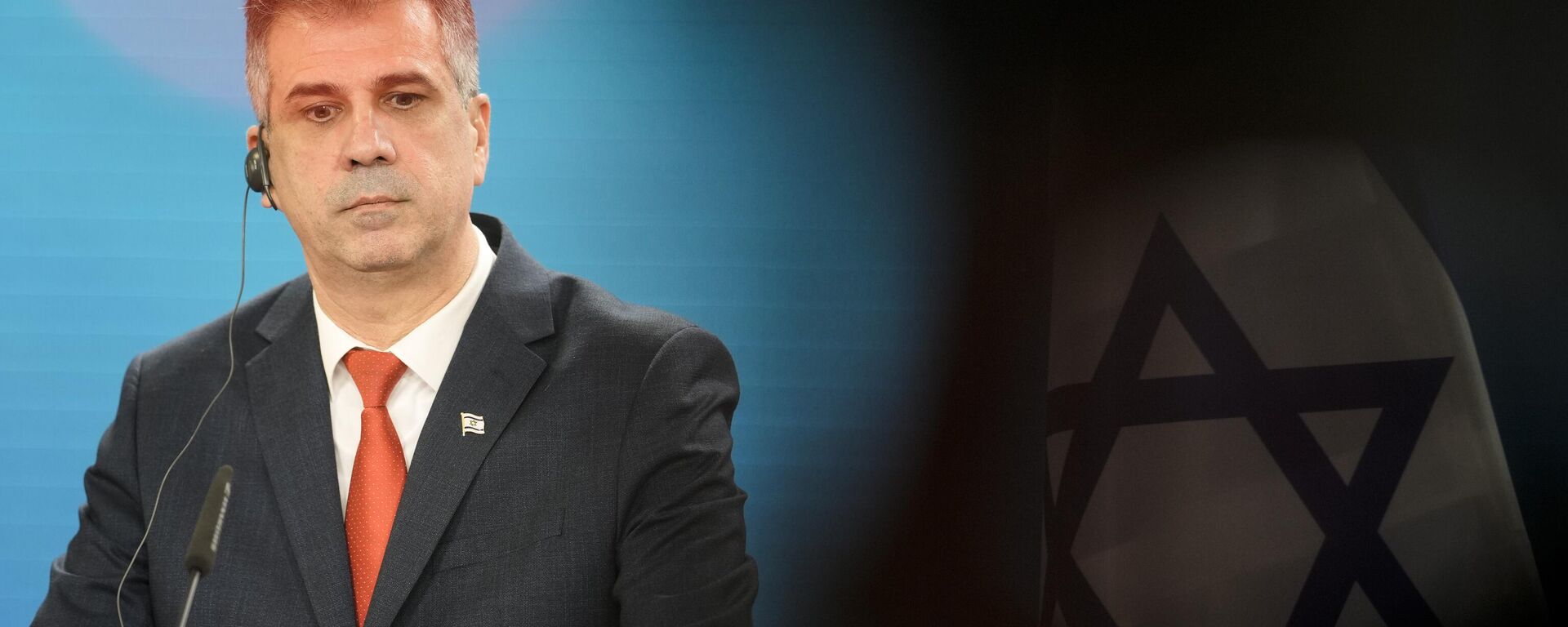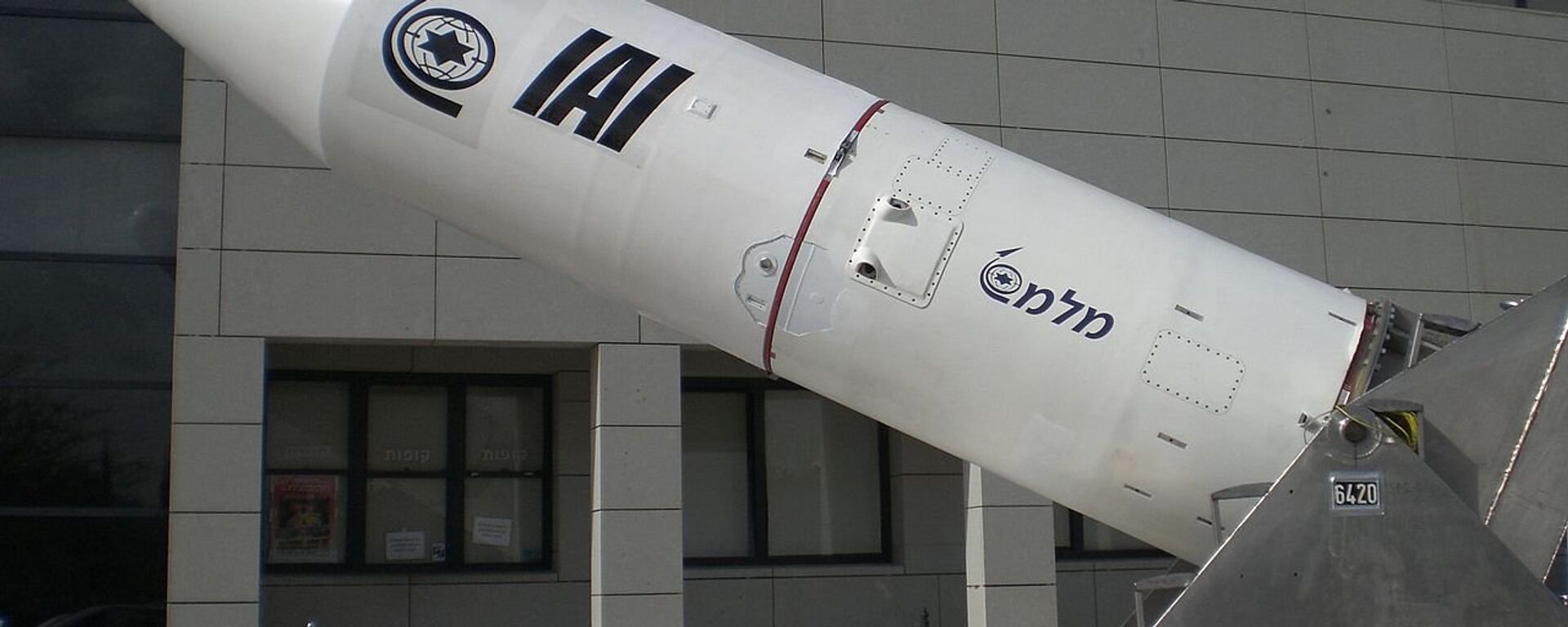https://sputnikglobe.com/20230523/israel-boasts-of-ability-to-hit-iran-as-nuclear-tensions-seethe-1110543950.html
Israel Boasts of 'Ability to Hit Iran' as Nuclear Tensions Seethe
Israel Boasts of 'Ability to Hit Iran' as Nuclear Tensions Seethe
Sputnik International
Tel Aviv has spent well over a decade accusing Tehran of pursuing nuclear weapons. Iran has consistently denied these claims, and has called on the international community to pay closer attention to Israel's nukes instead.
2023-05-23T17:40+0000
2023-05-23T17:40+0000
2023-05-23T17:40+0000
world
israel
iran
tehran
israel defense forces (idf)
international atomic energy agency (iaea)
tel aviv
nuclear
strike
https://cdn1.img.sputnikglobe.com/img/07e7/05/17/1110543793_0:37:700:431_1920x0_80_0_0_fa583db9cafd902c06ea2247c7a2ab7c.jpg
Israel Defense Forces Chief of General Staff Herzi Halevi has announced the nation's readiness to conduct strikes against Iran in the event of "negative developments" involving Tehran's nuclear program, and urged for outlays into the IDF to further improve Tel Aviv’s military capabilities."Without going into details, there are possible negative developments on the horizon that could prompt action," Halevi said, speaking at a security conference in Herzliya, Israel on Tuesday.Halevi characterized the current Israeli military potential prepared to attack Tehran as "good," but recommended that they be further "strengthened" so that Tel Aviv "can carry out a broad campaign against Iran."The IDF faces a number of hurdles which hamper its capabilities against Iran, Halevi admitted, pointing out that the country is over 1,500 km from Israel, which makes it a challenging target for Israel’s air force.Commenting on the trend toward diplomatic rapprochement between Iran and other Gulf States, including regional heavyweight Saudi Arabia, Halevi brushed off its strategic significance."There is a phenomenon during the past months of some countries around us engaging in rapprochement with Iran. But I don’t think it is a result of the fact that these states respect Iran or trust it or want a peace accord with it…I believe it is the result of their desire to lower the temperature in their surroundings and not bring up any conflicts – which is their choice," he said.Bitter EnemiesIsrael and Iran have been sworn enemies ever since the Iranian Revolution of 1979, which ousted the country’s US-backed dictator, and gave rise to an Islamic Republican government in Tehran which refused to recognize Israel’s right to exist. The two countries have been engaged in a bitter, secret war on multiple fronts over the years and decades, including a long-running cyberwar, a covert sea war, and proxy conflicts in Syria and Lebanon.Tel Aviv accuses Tehran of seeking to build a nuclear bomb. Tehran maintains its right to continue its uranium enrichment activities under its peaceful nuclear energy program, and has stressed repeatedly that it has no plans to pursue nuclear weapons, weapons of mass destruction of any kind. Instead, the Islamic Republic relies on a massive arsenal of conventional ballistic and cruise missiles and drones as its primary deterrent to aggression.Iran has asked the International Atomic Energy Agency and the United Nations Security Council some uncomfortable questions about why its peaceful nuclear activities are subjected to strict international monitoring, while these same agencies have turned a blind eye to Israel, which is widely suspected of possessing dozens of nuclear weapons. Tel Aviv does not admit its nuclear weapons status, instead pursuing a policy of "deliberate ambiguity" on the matter.Israel and the United States have engaged in joint training activities simulating attacks on Iran’s nuclear facilities, with Tel Aviv laying out a special $1.5 billion to prepare for such an eventuality. However, some Israeli officials have warned of the catastrophic consequences which could befall Tel Aviv if it ever proceeded with an attack on Iran.
https://sputnikglobe.com/20230520/israel-saudi-arabia-to-normalize-relations-eventually---foreign-minister-1110481092.html
https://sputnikglobe.com/20210306/iran-asks-why-israel-gets-preferential-treatment-with-iaea-despite-its-arsenal-of-nukes-1082272431.html
israel
iran
tehran
tel aviv
Sputnik International
feedback@sputniknews.com
+74956456601
MIA „Rossiya Segodnya“
2023
News
en_EN
Sputnik International
feedback@sputniknews.com
+74956456601
MIA „Rossiya Segodnya“
Sputnik International
feedback@sputniknews.com
+74956456601
MIA „Rossiya Segodnya“
iran, israel, tensions, nuclear, attack, strike, capabilities, does israel have nuclear arms, israeli nuclear arms, israel warns it can hit iran, israeli-iran tensions, does iran have nuclear weapons, iranian nuclear weapons
iran, israel, tensions, nuclear, attack, strike, capabilities, does israel have nuclear arms, israeli nuclear arms, israel warns it can hit iran, israeli-iran tensions, does iran have nuclear weapons, iranian nuclear weapons
Israel Boasts of 'Ability to Hit Iran' as Nuclear Tensions Seethe
Tel Aviv has spent well over a decade accusing Tehran of pursuing nuclear weapons. The Islamic Republic has consistently denied these claims, and has called on the international community to pay closer attention to Israel, suggesting that the Jewish state has its own stockpile of nukes.
Israel Defense Forces Chief of General Staff Herzi Halevi has announced the nation's readiness to conduct strikes against Iran in the event of "negative developments" involving Tehran's nuclear program, and urged for outlays into the IDF to further improve Tel Aviv’s military capabilities.
"Without going into details, there are possible negative developments on the horizon that could prompt action," Halevi
said, speaking at a security conference in Herzliya, Israel on Tuesday.
"Iran has made more progress in uranium enrichment than ever before. We are also closely examining other aspects of the way to nuclear capability," the commander said, warning Tehran that "we have abilities and others have abilities," and that Israel has "the ability to hit Iran."
Halevi characterized the current Israeli military potential prepared to attack Tehran as "good," but recommended that they be further "strengthened" so that Tel Aviv "can carry out a broad campaign against Iran."
The IDF faces a number of hurdles which hamper its capabilities against Iran, Halevi admitted, pointing out that the country is over 1,500 km from Israel, which makes it a challenging target for Israel’s air force.
"The IDF was built to conduct warfare in our backyard. We don't have expeditionary forces, it's not in our military culture, and we must build those abilities. Iran is big – it's 70 times the size of Israel. When it deploys its ability all over this domain we need to know where things are to be able to hurt every point on this huge geographical domain. It's a different challenge than we faced before. Iran also has a big population – ten times the population of Israel. It has a big economy…On one measurement they are close to us on a different measurement it seems a bit bigger. But the fifth number that is important is our opportunity: the product per capita of Israel is almost four times the per capita product of the Iranian economy, which is our opportunity because this is quality," the commander said.
Commenting on the trend toward diplomatic rapprochement between Iran and other Gulf States, including regional heavyweight Saudi Arabia, Halevi brushed off its strategic significance.
"There is a phenomenon during the past months of some countries around us engaging in rapprochement with Iran. But I don’t think it is a result of the fact that these states respect Iran or trust it or want a peace accord with it…I believe it is the result of their desire to lower the temperature in their surroundings and not bring up any conflicts – which is their choice," he said.
Israel and Iran have been sworn enemies ever since the Iranian Revolution of 1979, which ousted the country’s US-backed dictator, and gave rise to an Islamic Republican government in Tehran which refused to recognize Israel’s right to exist. The two countries have been engaged in a bitter, secret war on multiple fronts over the years and decades, including a long-running
cyberwar, a
covert sea war, and
proxy conflicts in Syria and
Lebanon.
Tel Aviv accuses Tehran of seeking to build a nuclear bomb. Tehran maintains its right to continue its uranium enrichment activities under its peaceful nuclear energy program, and has stressed repeatedly that it has no plans to pursue nuclear weapons, weapons of mass destruction of any kind. Instead, the Islamic Republic relies on a massive arsenal of conventional ballistic and cruise missiles and drones as its primary deterrent to aggression.
Iran has asked the International Atomic Energy Agency and the United Nations Security Council some uncomfortable questions about why its peaceful nuclear activities are subjected to strict international monitoring, while these same agencies have turned a blind eye to Israel, which is
widely suspected of possessing dozens of nuclear weapons. Tel Aviv does not admit its nuclear weapons status, instead pursuing a policy of "deliberate ambiguity" on the matter.
Israel and the United States have engaged in joint training activities simulating attacks on Iran’s nuclear facilities, with Tel Aviv laying out a special $1.5 billion to prepare for such an eventuality. However, some
Israeli officials have warned of the catastrophic consequences which could befall Tel Aviv if it ever proceeded with an attack on Iran.




